专四语法部分
(完整word版)专四语法之独立主格

独立主格结构(Nominative Absolute Structure/ Absolute Construction)由名词或代词主格+ -ing分词、-ed分词、形容词、副词或介词词组等成分组成, 通常在句中起状语从句的作用。
它多见于文学体裁, 能使句子结构紧凑, 形象具体, 描述生动。
1)I.如果独立分词结构表示时间、原因、条件等, 在翻译时, 根据具体的情况可加适当的连词如“因为”, “由于”, “当……”,“……之后”, “如果”, “只要”等, 然后译成状语从句。
例如:2)Th.mea.over,w.bega.t.wor.again.3)吃完饭后, 我们又开始工作了。
4)Weathe.permitting.th.sport.meetin.wil.b.hel.o.Friday..5)如果天气允许的话, 运动会将在星期五举行。
6)Ther.bein.n.coffe.left.the.ha.t.mak.d.wit.tea.7)因为没有咖啡了, 他们只好用茶凑合。
8)Th.presiden.assassinated.th.whol.countr.wa.i.dee.sorrow.总统遭暗杀了,国人都沉浸在深深的悲痛中。
9)Al.flight.havin.bee.cancele.becaus.o.th.snowstorm.w.decide.t.ta k.th.train.因为暴风雨的缘故, 所有的航班都取消了, 我们于是决定坐火车。
Wit.academi.categorie.bein.wha.the.are.th.historia.rarel.tangle.wit.psycho logists.由于各学术领域往往自成一体,历史学家很少会与心理学家发生纠葛。
(..“介词with或without+名词+分词/形容词/副词/介词词组”一致)H.cam.int.th.room.hi.ear.re.wit.cold.他走进房间,耳朵都冻红了。
专四语法点

专四语法总结(13)十五、复合句——副词性(状语)从句副词在句中起状语作用,故如果起状语作用的部分为一个句子,那么该句便是副词性从句,也称状语从句。
状语从句可细分为:时间、地点、条件、原因、让步、目的、结果、比较、方式等。
状语从句的测试重点为:考查考生对主从句之间逻辑意义关系的把握,看其是否能选择正确的从属连词。
1.条件状语从句的常考知识点(1)if与unless的用法。
if和unless都是引导条件状语从句的连词,考生应尤其注意unless的用法,因为它表示反面条件,相当于if not“如果不”、“除非”。
如:In debating, one must correct the opponent’s facts, deny the relevance of his proof, or deny that what he presents as proof, if relevant, is sufficient.(2)复合连词as long as,so long as,as far as,on condition that,in the event that;动词及分词provided(that),providing(that),given that, suppose/supposing(that),assuming,say等引导条件状语从句。
如:You can arrive in Beijing earlier for the meeting provided you don’t mind taking the night train.Assuming he is diligent in his studies at ordinary times, he is sure to pass the test.In the event that she has not been informed, I will tellher. (如果……)You can go swimming on condition that you don’t go too farfrom the river bank. (如果……)Suppose it rained, we would still go. (假如……) Say it were true, what would you do about it? (假如……)(3)祈使句表示条件。
专四语法 可可英语

专四语法可可英语好的,以下是一篇有关可可英语专四语法的文章:可可英语专四语法精讲一、虚拟语气虚拟语气是英语语法中一个非常重要的部分,在专四考试中也是必考的知识点。
虚拟语气用来表示与实际情况相反的情况或者表达主观上的愿望、建议、猜测等。
虚拟语气的用法包括与现在事实相反、与过去事实相反和与将来事实相反三种情况。
1. 与现在事实相反:使用动词的过去式(be动词用were),从句使用would+动词原形。
例如:If I were you,I would choose to study abroad.(如果我是你,我会选择出国留学。
)2. 与过去事实相反:使用“would+have+过去分词”,从句使用“had+过去分词”。
例如:If we had known the answer,we would have told you.(如果我们知道答案,我们早就告诉你了。
)3. 与将来事实相反:使用“would+动词原形”,从句使用“were+to+动词原形”或者“should+动词原形”。
例如:If it were to rain tomorrow,the football match would be postponed.(如果明天下雨,足球比赛就会被推迟。
)二、定语从句定语从句是英语语法中的另一个重要知识点,也是专四考试的重点。
定语从句用来修饰名词,通常放在所修饰名词之后。
引导定语从句的关联词包括that、which、who、whose等。
1. 使用that的情况:当先行词为all、something、nothing、this等不定代词时,或者先行词被形容词最高级修饰时,多用that引导定语从句。
例如:This is the most interesting book that I have ever read.(这是我读过的最有趣的书。
)2. 使用which的情况:当引导词前面有逗号或放在句末时,通常使用which。
英语专四语法
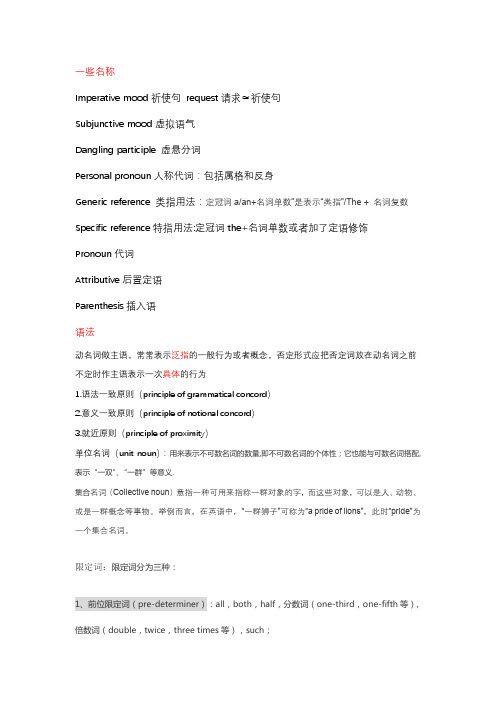
一些名称Imperative mood祈使句request请求≈祈使句Subjunctive mood虚拟语气Dangling participle 虚悬分词Personal pronoun人称代词:包括属格和反身Generic reference 类指用法:定冠词a/an+名词单数”是表示“类指”/The + 名词复数Specific reference特指用法:定冠词the+名词单数或者加了定语修饰Pronoun代词Attributive后置定语Parenthesis插入语语法动名词做主语,常常表示泛指的一般行为或者概念,否定形式应把否定词放在动名词之前不定时作主语表示一次具体的行为1.语法一致原则(principle of grammatical concord)2.意义一致原则(principle of notional concord)3.就近原则(principle of proximity)单位名词(unit noun):用来表示不可数名词的数量,即不可数名词的个体性;它也能与可数名词搭配,表示“一双”、“一群”等意义.集合名词(Collective noun)意指一种可用来指称一群对象的字,而这些对象,可以是人、动物、或是一群概念等事物。
举例而言,在英语中,“一群狮子”可称为“a pride of lions”,此时“pride”为一个集合名词。
限定词:限定词分为三种:1、前位限定词(pre-determiner):all,both,half,分数词(one-third,one-fifth等), 倍数词(double,twice,three times等),such;2、中位限定词(central-determiner):冠词(a,an,the),指示代词(this,that,these,those),不定代词(some,any,either),否定词(no,neither),全称限定词(every,each),所有格(my,your,John's);3、后位限定词(post-determiner):基数词(three,200),序数词(first,second,300th,last),数量词及短语(many,much,little,few,plenty of,a lot of,a large number of)等。
英语专四语法复习内容

英语专四语法复习内容想要通过英语专四考试,就必须掌握英语专四的语法。
那么英语专四的语法有哪些呢?下面由店铺为大家整理的英语专四语法内容,希望大家喜欢!英语专四语法内容一 There be 结构1. There be结构There were very few people left when we got there.There have been many such incidents.Nearby there had been a fight in full progress.也可以是情态动词 +beThere can be very little doubt about his guilt.There may always be instances about which we are uncertain. There ought to / should be some instructions on the lid.还可以是There +情态动词+ be 的完成时There may have been an accident.If the criminal had come this way, there would be / would have been footprints. There should / ought to have been someone on duty all the time.2. There + 半动词+ be,这里很少用完成体形式.There is certain to be trouble at the factory.There is sure / likely to be some rain tonight. There seems / appears to be no doubt about it.3. There be结构也可有被动式,这类there be结构有些可以与there be结构的一般形式相互转换。
专四语法讲义

专四语法部分一、总体概况:语法考点:三大从句——名词、定从、状从非谓语动词时态、语态、语气、情态动词其他二、从句讲解三大从句(一)三大从句五种基本句式主语+谓语vt+宾语主语+谓语vt+宾语+宾语主语+谓语vt+宾语+补语主语+谓语vi+状语主语+系动词+表语状语,主语(定语)谓语宾语状语(定从) 系动词表语(状从)(同位语)(非谓语)(非谓语)(介词短语)(介词短语)(副词)长难句解题技巧:抓住干,定从句逗号原则:在英语句子中,逗号是不能连接两个独立完整的句子的。
名词性从句三大从句(二)两步解题法1.抓连词2.状从中的连接词——常考固搭so…that in order that such…that with the result that so thatthat引导名词性从句——that+完整句子(1)主语从句e.g. It is true that he passed the exam.It is said that he passed the exam.It is a pity that he didn’t pass the exam.强调句式It is/was+被强调部分+that+不完整句子主、宾、表、状e.g. I met him in the street.It was him that I met in the street.It was in the street that I met him.(2)宾语从句主+谓语vt+(that)+完整句子e.g. I know (that) he passed the exam.(3)表语从句主+系动词+that+完整句子e.g. My suggestion is that he go with us tomorrow.(4)同位语从句抽象名词+that+完整句子e.g. My suggestion that he go with us tomorrow.There is/are +抽象名词+that+完整句子Answer,belief,concept,conclusion,decision,discovery,doubt,evidence,sign,fact,hope,idea,informati on,knowledge,suggestion,thought,probability…On the condition that…Despite the fact that…On the understanding that…that 引导限定性定从all some any one(s) every each…the first the lastthe only the veryn+that+不完整句子作从句中的主、宾、表语e.g. The book that was written by him is pop.that引导同位语从句抽象名词+that+完整句子that 引导限定性定从n+that+不完整句子作从句中的主、宾、表语The fact that he passed the exam was true.The fact that he found was true.三大从句(三)What=all that; the thing that; the person thatWhat 只引导主从、宾从、表从,不能引导定从和同位从What+不完整句子What he said made me happy.e.g. _____it turned out,it was Italian movie.A What_____it turned out was Italian movie.A WhatI know what he said.I listen to what he said.This is what he said.词______+ 不完整句子n A what Xvt/介词/系动词 A what 可以考虑词,_______+不完整句子A whatB whichC thatwhat 与how 的区别I don’t know what to do.I don’t know how to do it.I’m thinking of ______to do about it.A.whatB. how介词短语在句子的位置1)作状语句子+介短/介短+句子2)作定语n+介短3)作表语系+介短wh—ever与no matter wh—区别让步、名从让步I don’t believe whatever he said.Whatever happens,don’t panic.公式however + adj/adv + 主语+ 谓语e.g. It caused them to think about _______they might control the experiences of children to duce responsible and productive adults.A. whatB. howC. whateverD. however if 与 whether 的区别 if_______about the university the mind, love, dreams, or ordering a drink. A) whatB) whether C) while D) if Never ask a child _______he likes or dislikes.A) what B) whether C) that D) which We know, however,________ no two places are exactly the same. A) Although B) whether C) since D) that 三大从句(四) 定语从句两步解题法1. 抓先行项(指人、物、整句话内容)2. 抓关系词在定语从句中的成分e.g. This is the house_______①I once lived.②I once visited.①where/in which②that/which/xThis is the very house_________ I once visited.e.g. I’ll never forget the day______①I met him.②I spent with him.①when/on which②that/which/xI’ll never forget the very day______ I spent with him. 地点n where 主+谓vt+宾/宾/宾补主+谓vi主+系+表时间n when 主+谓vt+宾/宾/宾补主+谓vi 主+系+表the reason why 主+谓vt+宾/宾/宾补 主+谓vi 主+系+表 三大从句(五)Which 在专四考试中,只考定语从句。
英语专四语法、词汇知识大全
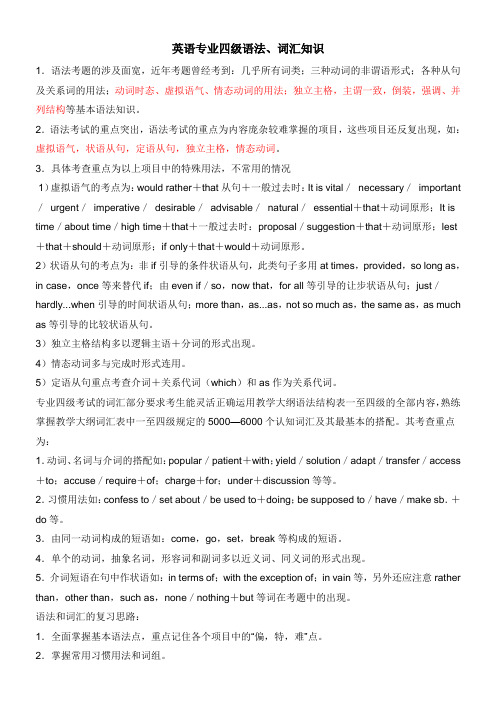
英语专业四级语法、词汇知识1.语法考题的涉及面宽,近年考题曾经考到:几乎所有词类;三种动词的非谓语形式;各种从句及关系词的用法;动词时态、虚拟语气、情态动词的用法;独立主格,主谓一致,倒装,强调、并列结构等基本语法知识。
2.语法考试的重点突出,语法考试的重点为内容庞杂较难掌握的项目,这些项目还反复出现,如:虚拟语气,状语从句,定语从句,独立主格,情态动词。
3.具体考查重点为以上项目中的特殊用法,不常用的情况1)虚拟语气的考点为:would rather+that从句+一般过去时:It is vital/necessary/important /urgent/imperative/desirable/advisable/natural/essential+that+动词原形;It is time/about time/high time+that+一般过去时:proposal/suggestion+that+动词原形;lest +that+should+动词原形;if only+that+would+动词原形。
2)状语从句的考点为:非if引导的条件状语从句,此类句子多用at times,provided,so long as,in case,once等来替代if;由even if/so,now that,for all等引导的让步状语从句;just/hardly...when引导的时间状语从句;more than,as...as,not so much as,the same as,as much as等引导的比较状语从句。
3)独立主格结构多以逻辑主语+分词的形式出现。
4)情态动词多与完成时形式连用。
5)定语从句重点考查介词+关系代词(which)和as作为关系代词。
专业四级考试的词汇部分要求考生能灵活正确运用教学大纲语法结构表一至四级的全部内容,熟练掌握教学大纲词汇表中一至四级规定的5000—6000个认知词汇及其最基本的搭配。
(完整word版)专四语法重点总结,推荐文档
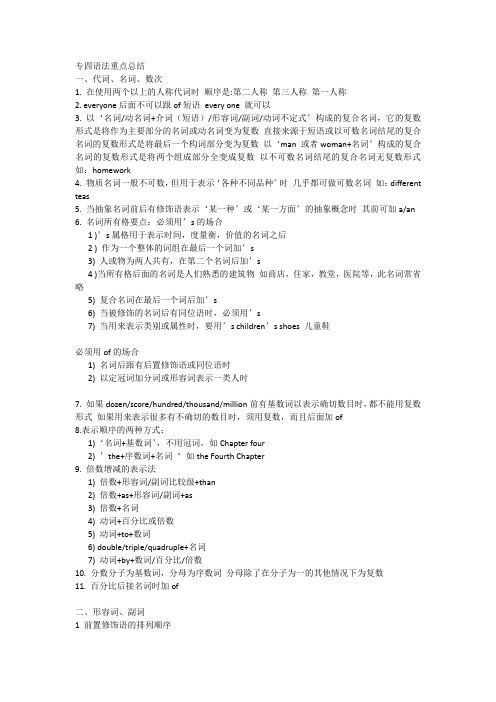
专四语法重点总结一、代词、名词、数次1. 在使用两个以上的人称代词时顺序是:第二人称第三人称第一人称2. everyone后面不可以跟of短语every one 就可以3. 以‘名词/动名词+介词(短语)/形容词/副词/动词不定式’构成的复合名词,它的复数形式是将作为主要部分的名词或动名词变为复数直接来源于短语或以可数名词结尾的复合名词的复数形式是将最后一个构词部分变为复数以‘man 或者woman+名词’构成的复合名词的复数形式是将两个组成部分全变成复数以不可数名词结尾的复合名词无复数形式如:homework4. 物质名词一般不可数,但用于表示‘各种不同品种’时几乎都可做可数名词如:different teas5. 当抽象名词前后有修饰语表示‘某一种’或‘某一方面’的抽象概念时其前可加a/an6. 名词所有格要点:必须用’s的场合1 )’s属格用于表示时间,度量衡,价值的名词之后2 ) 作为一个整体的词组在最后一个词加’s3) 人或物为两人共有,在第二个名词后加’s4 )当所有格后面的名词是人们熟悉的建筑物如商店,住家,教堂,医院等,此名词常省略5) 复合名词在最后一个词后加’s6) 当被修饰的名词后有同位语时,必须用’s7) 当用来表示类别或属性时,要用’s children’s shoes 儿童鞋必须用of的场合1) 名词后跟有后置修饰语或同位语时2) 以定冠词加分词或形容词表示一类人时7. 如果dozen/score/hundred/thousand/million前有基数词以表示确切数目时,都不能用复数形式如果用来表示很多有不确切的数目时,须用复数,而且后面加of8.表示顺序的两种方式:1)‘名词+基数词’,不用冠词,如Chapter four2) ’the+序数词+名词‘如the Fourth Chapter9. 倍数增减的表示法1) 倍数+形容词/副词比较级+than2) 倍数+as+形容词/副词+as3) 倍数+名词4) 动词+百分比或倍数5) 动词+to+数词6) double/triple/quadruple+名词7) 动词+by+数词/百分比/倍数10. 分数分子为基数词,分母为序数词分母除了在分子为一的其他情况下为复数11. 百分比后接名词时加of二、形容词、副词1 前置修饰语的排列顺序可以置于冠词前的形容词(all both such) -----冠词,指示形容词,所有格形容词,不定形容词(a an the this your his any some)-----------基数词(one ) 序数词(first)------------ 表示性质,状态,质量的形容词(good useful)--------------表示大小,长短,形状的形容词----------------表示年龄,新旧,温度的形容词------------表示颜色的形容词---------------------表示国籍,产地,区域的形容词-----------表示材料,用做形容词的名词----------动名词,分词2.后置修饰语由前缀a-构成的形容词3.形容词修饰由some-,any-,every-,no-,-body,-one,-thing等组成的复合不定代词时,必须后置4.enough作形容词修饰名词时既可放前又可放后,但当它作副词修饰形容词或副词时,必须后置5.有些形容词本身就有‘比……年长’,‘比……优等的意思这些形容词后面用介词to 而不用than6.much too 作为副词短语修饰形容词或副词,不修饰名词7.more 不能用来修饰比较级8.与名词连用的more of a .. ./ as much of a... / more of a.... 意为更像……9.as much of a……意为称得上,less of a 意为算不上10.none other than(不是别人,正是)=no other than11.any/sone/every与other连用时,其后若用可数名词,一般为单数三、情态动词、虚拟语气1.can 用于否定句cannot(help)but表示不能不,只能(but后跟不带to的动词不定式)2.must 表示禁止,一定不要时的否定式为mustn’t 当它表示有把握的推断时意为一定准是时它的否定形式为can’t3.need doing=need to be done 这个句型表示被动意味4.need not have done sth 表示本来没有必要做某事(经常考)虚拟语气1.It is (high/about/the)time... 谓语动词用过去式指现在或将来的情况表示早该做某事而现在已经有点晚了2.It is the first(second/third)time后的that从句中,谓语动词要用完成体来表示一种经验3.as if/though 的虚拟要点1) 对当时事实的假设,从句谓语用过去式,be动词一律用were2)对过去事实的假设,从句谓语用过去完成式3)对未来事实的假设,从句谓语用would+动词原型五、比较级比较等级的含义:英语中形容词与副词有三个比较等级,即原级,比较级和最高级。
专四词汇与语法
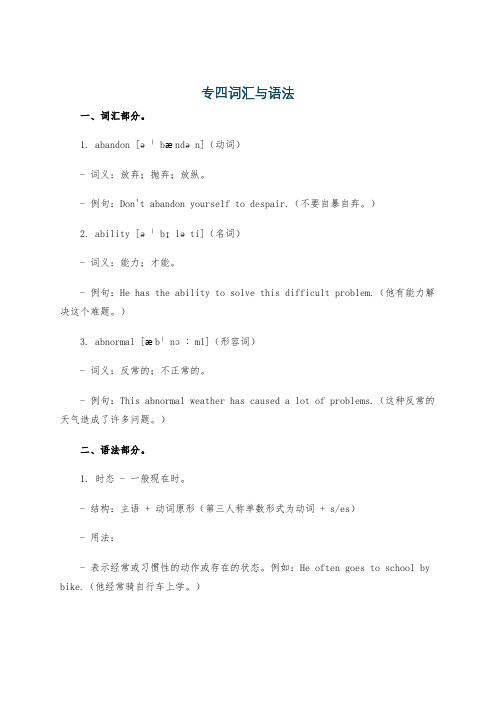
专四词汇与语法一、词汇部分。
1. abandon [əˈbændən](动词)- 词义:放弃;抛弃;放纵。
- 例句:Don't abandon yourself to despair.(不要自暴自弃。
)2. ability [əˈbɪləti](名词)- 词义:能力;才能。
- 例句:He has the ability to solve this difficult problem.(他有能力解决这个难题。
)3. abnormal [æbˈnɔːml](形容词)- 词义:反常的;不正常的。
- 例句:This abnormal weather has caused a lot of problems.(这种反常的天气造成了许多问题。
)二、语法部分。
1. 时态 - 一般现在时。
- 结构:主语 + 动词原形(第三人称单数形式为动词 + s/es)- 用法:- 表示经常或习惯性的动作或存在的状态。
例如:He often goes to school by bike.(他经常骑自行车上学。
)- 表示客观事实或普遍真理。
例如:The earth moves around the sun.(地球绕着太阳转。
)2. 名词的数 - 可数名词复数形式。
- 规则变化:- 一般情况加 -s,如book - books。
- 以s, x, ch, sh结尾的加 -es,如box - boxes。
- 以辅音字母 + y结尾的,变y为i加 -es,如city - cities。
- 不规则变化:- 如man - men,woman - women,child - children等。
3. 形容词和副词的比较级和最高级。
- 规则变化:- 单音节词和部分双音节词:- 一般情况加 -er(比较级)和 -est(最高级),如tall - taller - tallest。
- 以e结尾的加 -r和 -st,如nice - nicer - nicest。
专四常考语法点
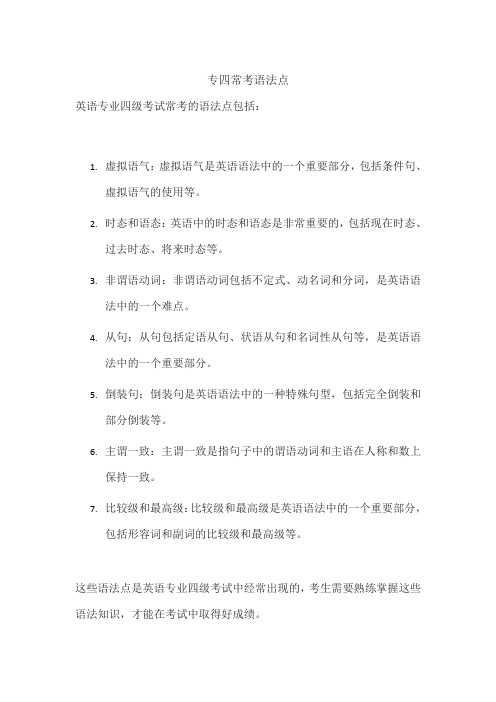
专四常考语法点
英语专业四级考试常考的语法点包括:
1.虚拟语气:虚拟语气是英语语法中的一个重要部分,包括条件句、
虚拟语气的使用等。
2.时态和语态:英语中的时态和语态是非常重要的,包括现在时态、
过去时态、将来时态等。
3.非谓语动词:非谓语动词包括不定式、动名词和分词,是英语语
法中的一个难点。
4.从句:从句包括定语从句、状语从句和名词性从句等,是英语语
法中的一个重要部分。
5.倒装句:倒装句是英语语法中的一种特殊句型,包括完全倒装和
部分倒装等。
6.主谓一致:主谓一致是指句子中的谓语动词和主语在人称和数上
保持一致。
7.比较级和最高级:比较级和最高级是英语语法中的一个重要部分,
包括形容词和副词的比较级和最高级等。
这些语法点是英语专业四级考试中经常出现的,考生需要熟练掌握这些语法知识,才能在考试中取得好成绩。
专四常考语法点汇总

专四常考语法点汇总语法与词汇专项语法核⼼考点⼀:从属分句复合句= 主句+从句(1个或1个以上)要点1从属分句是复合句必不可少的组成部分,以语法功能作为分类标准,从属分句可以分为状语从句、关系从句(即定语从句)和名词性从句。
其中状语从句可分为时间、地点、原因、结果、程度、⽬的、条件、让步和⽅式等;名词性从句可分为主语从句、宾语从句、表语从句、同位语从句。
要点 2 状语从句的考点集中在⽅式、条件、让步、⽅式和时间状语从句上;关系从句的考点集中在关系代词的选择,限制性定语从句和⾮限制性定语从句的区别;名词性从句的考点集中在宾语从句和同位语从句。
⼀状语从句状语从句真题剖析:1 Nine is to three _____ three is to one. (2008, 53)A. whenB. thatC. whichD. what2 ______ he wanted to go out with his friends at the weekend, he had to stay behind to finish his assignment. (2008, 55)A. Much thoughB. Much asC. As muchD. Thouth much3 Men differ from animals ____ they can think and speak. (2008, 54)A. for whichB. for thatC. in thatD. in which4 They stood chatting together as easily and naturally as ____. (2008, 60)A. it could beB. could beC. it wasD. was5 The couple had no sooner got to the station ______ the coach left. (2009,60)A. whenB. asC. untilD. than6 ____ the boss says, it is unreasonable to ask me to work overtime without pay. (2010,55)A. WhateverB. WheneverC. WhicheverD. However7 Fool ____ Jerry is, he could not have done such a thing.A. whoB. asC. likeD. that8 He asked me to lend him some money, which I agreed to do, ___ that he paid me back the following week. (2005)A. on occasionB. on purposeC. on conditionD. only if9 Which of the following contains an adverbial clause of cause?A. I got a job as soon as I left university.B. As there was on answer, I wrote again.C. You must do the exercise as I show you.D. Wealthy as he is, Mark is not a happy man.状语从句重点总结:⼏种不常⽤的条件状语从句举例:In the event that she can not arrive on time, we will go first.Suppose it snowed, we would still go.Say what he said were true, what would you do about it?1. ⼏种不常⽤的让步状语从句举例:In spite of the fact that he was deaf and dumb, he had a genius for music.While the grandparents love the children, they are strict with them.Much as she needed the job, she had to refuse.For all that there were a lot of difficulties, he finally entered the final competition and won.Granted you have made much progress, you should not be conceited.2. ⽤了although或though,就⼀定不能再后⾯的从句中同时⽤but,但是though 可以和yet 连⽤。
英语专四语法总结
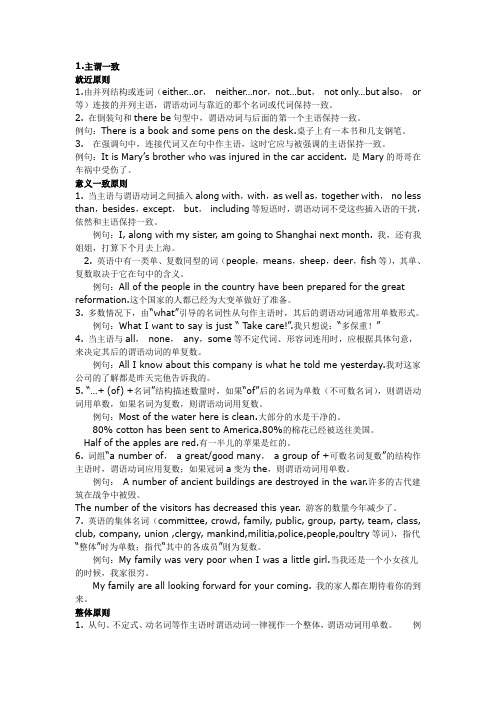
1.主谓一致就近原则1.由并列结构或连词(either…or,neither…nor,not…but,not only…but also,or 等)连接的并列主语,谓语动词与靠近的那个名词或代词保持一致。
2. 在倒装句和there be句型中,谓语动词与后面的第一个主语保持一致。
例句:There is a book and some pens on the desk.桌子上有一本书和几支钢笔。
3. 在强调句中,连接代词又在句中作主语,这时它应与被强调的主语保持一致。
例句:It is Ma ry’s brother who was injured in the car accident. 是Mary的哥哥在车祸中受伤了。
意义一致原则1. 当主语与谓语动词之间插入along with,with,as well as,together with,no less than,besides,except,but,including等短语时,谓语动词不受这些插入语的干扰,依然和主语保持一致。
例句:I, along with my sister, am going to Shanghai next month. 我,还有我姐姐,打算下个月去上海。
2. 英语中有一类单、复数同型的词(people,means,sheep,deer,fish等),其单、复数取决于它在句中的含义。
例句:All of the people in the country have been prepared for the great reformation.这个国家的人都已经为大变革做好了准备。
3. 多数情况下,由“what”引导的名词性从句作主语时,其后的谓语动词通常用单数形式。
例句:What I want to say is just “ T ake care!”.我只想说:“多保重!”4. 当主语与all,none,any,some等不定代词、形容词连用时,应根据具体句意,来决定其后的谓语动词的单复数。
专四考试项目

专四考试项目一、听力1. 听力部分通常会有不同的题型,像对话类的。
对话可能是关于日常话题的,比如大学生活中的选课啊,宿舍里的趣事啊,或者是一些文化交流方面的内容。
就像你在校园里和同学聊天一样,只不过是通过听力的形式呈现出来。
2. 还有短文听力。
短文可能是讲述一个故事,或者是介绍某种知识。
比如说介绍一个历史事件,像法国大革命之类的,或者是讲一种科学现象,像全球变暖对动物栖息地的影响。
二、语法与词汇1. 语法题会考查很多语法点。
像时态,有时候会给你一个句子,让你判断应该用一般现在时还是现在完成时。
比如说“I (live) here for five years.”这里就应该填“have lived”,这就是对现在完成时的考查。
2. 词汇方面呢,会有近义词的辨析。
例如“big”和“large”,虽然都表示大的意思,但是在用法上还是有区别的。
“big”更口语化,而“large”有时候会用在比较正式的描述中,像“a large amount of money”。
还有一些词汇的固定搭配,比如“pay atten tion to”,这个搭配是固定的,不能说“pay attention for”。
三、阅读理解1. 阅读文章的类型也是多种多样的。
有记叙文,可能是讲述一个人的经历,像一个旅行者的游记,描述他在不同地方的所见所闻。
2. 也有说明文,比如介绍一种新技术,像5G技术是如何改变我们的生活的,从通信速度更快,到能够支持更多智能设备的连接等等。
3. 做阅读理解题的时候,要注意理解文章的主旨大意。
有些题目会直接问你文章主要讲了什么,这时候你就要概括全文内容。
还有细节题,需要你从文章中找到具体的信息,像文中提到的某个数据或者某个人物的观点。
四、写作1. 写作的话题通常是与大学生的生活、社会现象或者文化交流有关的。
比如说让你写关于大学生兼职的利弊,你就可以从赚零花钱、增加社会经验等好处,以及可能会影响学习等坏处来写。
专四语法分类真题答案解析
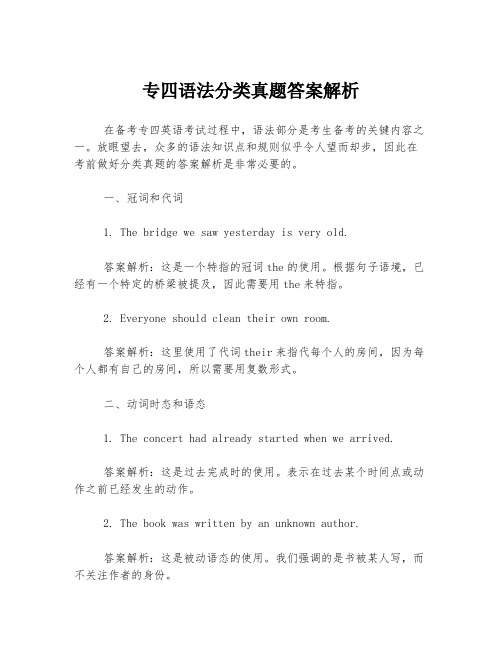
专四语法分类真题答案解析在备考专四英语考试过程中,语法部分是考生备考的关键内容之一。
放眼望去,众多的语法知识点和规则似乎令人望而却步,因此在考前做好分类真题的答案解析是非常必要的。
一、冠词和代词1. The bridge we saw yesterday is very old.答案解析:这是一个特指的冠词the的使用。
根据句子语境,已经有一个特定的桥梁被提及,因此需要用the来特指。
2. Everyone should clean their own room.答案解析:这里使用了代词their来指代每个人的房间,因为每个人都有自己的房间,所以需要用复数形式。
二、动词时态和语态1. The concert had already started when we arrived.答案解析:这是过去完成时的使用。
表示在过去某个时间点或动作之前已经发生的动作。
2. The book was written by an unknown author.答案解析:这是被动语态的使用。
我们强调的是书被某人写,而不关注作者的身份。
三、介词和副词1. I usually go to work by bus.答案解析:在这个句子中,介词by表示通过什么方式去上班。
2. He walked slowly along the narrow street.答案解析:副词slowly修饰动词walked,表示他走得慢。
四、从句和状语从句1. I will call you as soon as I get home.答案解析:这是一个时间状语从句,表示在我到家的时候立即给你打电话。
2. Although it was raining, we decided to go hiking.答案解析:Although引导一个让步状语从句,表示尽管下雨,但我们还是决定去远足。
五、形容词和副词的比较级和最高级1. This book is more interesting than that one.答案解析:这是比较级的使用,表示两本书相比较,其中一本更有趣。
专四语法汇总
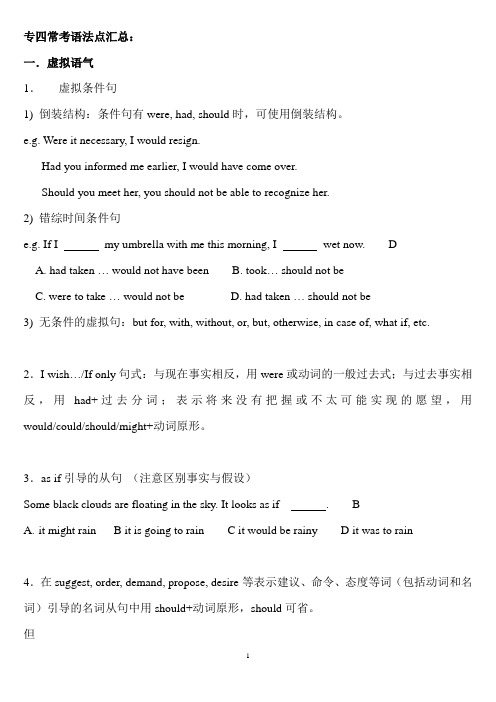
专四常考语法点汇总:一.虚拟语气1.虚拟条件句1) 倒装结构:条件句有were, had, should时,可使用倒装结构。
e.g. Were it necessary, I would resign.Had you informed me earlier, I would have come over.Should you meet her, you should not be able to recognize her.2) 错综时间条件句e.g. If I my umbrella with me this morning, I wet now. DA. had taken … would not have beenB. took… should not beC. were to take … would not beD. had taken … should not be3) 无条件的虚拟句:but for, with, without, or, but, otherwise, in case of, what if, etc.2.I wish…/If only句式:与现在事实相反,用were或动词的一般过去式;与过去事实相反,用had+过去分词;表示将来没有把握或不太可能实现的愿望,用would/could/should/might+动词原形。
3.as if引导的从句(注意区别事实与假设)Some black clouds are floating in the sky. It looks as if . BA.it might rain B it is going to rain C it would be rainy D it was to rain4.在suggest, order, demand, propose, desire等表示建议、命令、态度等词(包括动词和名词)引导的名词从句中用should+动词原形,should可省。
专四英语语法考点分析解析

语法考点之一:虚拟语气考点1. If从句中的虚拟语气1、与过去事实相反:从句sb had done,主句sb would(should, could, might)+ have done;2、省略if,从句的语序用到装,即将were, had或should移至主语的前面,但否定词not不前移。
3、与将来事实相反:从句sb did (should+do或were+to do),主句sb would (should, could, might)+do。
4、错综条件句:主句与从句的动作发生在不同的时间段。
比如:从句对过去虚拟,而主句对现在虚拟,即从句sb had done,主句sb would(should, could, might)+do;考点2:表示建议、要求、命令等动词如insist, order, command, suggest, advise, propose, ask, require, request, demand引导的从句和it引导的相应的分词、名词和形容词从句,谓语用(should)+动词原形。
考点3:It is +advisable, essential, important, imperative, incredible等从句,谓语用(should)+动词原形。
考点4:it is (high/about) time that的结构中,从句使用一般过去式。
例如:考点5:much as"尽管,虽然"引导让步状语从句,从句中用would have done表示假设。
考点6:if only, wish, as if/as though引导从句,与过去事实相反:had + done;与现在事实相反:动词过去式;与将来事实相反:could/would + do考点7:would rather/sooner从句中使用一般过去式或过去完成式分别表示对现在或过去的虚拟考点8:lest / for fear that+(should ) +原形动词。
英语专业四级语法汇总

语法回顾篇专四语法考点虚拟语气、情态动词、非谓语动词、复合句、倒装、小语法(省略,时态,反义疑问句,代词,强调句,主谓一致,冠词,形容词及副词)、as 的特殊用法。
专四英语语法考点串讲之一虚拟语气一般说来,有下列几种考点需要考生注意(十考点及两备考点)考点1. 与现在事实相反从句谓语动词用did(be用were),主句谓语动词would(should,could,might)+do;考点2. 与过去事实相反从句谓语动词用had done,主句谓语动词用would(should,could,might)+ have done;例如:43.I _________the party much more if there hadn‟t been quite such a crowd of people there.A. would enjoyB. will have enjoyedC. would have enjoyedD. will be enjoying49.All of us would have enjoyed the party much more if there _________ quite such a crowd of people there.A. weren‟tB. hasn‟t beenC. hadn‟t beenD. wouldn‟t考点3.与将来事实相反,从句谓语动词用:did(should+do或were + to do),主句谓语动词用:would(should,could,might)+do。
例如:43. If your car ___ any attention during the first 12 months, take it to an authorized dealer.(08年)• A. shall need C. would need• B. should need D. will need考点4. 时态的交叉现象,也就是主句与从句的动作发生在不同的时间段例如:If you had gone to see the doctor,you would be all right now.你要是早去看病,你现在就没事了。
- 1、下载文档前请自行甄别文档内容的完整性,平台不提供额外的编辑、内容补充、找答案等附加服务。
- 2、"仅部分预览"的文档,不可在线预览部分如存在完整性等问题,可反馈申请退款(可完整预览的文档不适用该条件!)。
- 3、如文档侵犯您的权益,请联系客服反馈,我们会尽快为您处理(人工客服工作时间:9:00-18:30)。
1与现在事实相反
从句—v.过去式(be在一、三人称后可用was/were,通常用were较多)
2与过去事实相反
从句—v.过去完成式(had done)
3与将来事实相反,即将来不太可能发生
从句--情态v. (might) + v.原形
Eg. He talks as if hewerea scholar. (In fact, he is not a scholar.)
用在wish后的宾语从句中,表示不可实现的愿望。
主句通常为I wish,从句用下列形式:
1与现在事实相反,即目前未能实现的愿望
从句--v.过去式(be→were)
2与过去事实相反,即过去未能实现的愿望
从句--①had done(v.过去完成式)
②情态v.+ have done(动词的完成式)
3将来不太可能实现的愿望
I second Mr. Green’s motion that the meetingbe put offuntil next week.
2上述动词的形容词后的that主语从句也要求相同形式的虚拟语气。
advisable, desirable, preferable, urgent, …
It is advisable that you (should) go to see a doctor.
If Iwereyou, Ishould go and seethe doctor at once.
Icould have mether if Ihad comea few minutes earlier.
If shehadn’t got uplate, shewouldn’t have beenlate for school.
It is desirable that you (should) speak the language fluently.
3上述动词的被动式引出的主语从句中也要求相同形式的虚拟语气。
It is decided that….
It is arranged that….
Eg. It is recommended that the project ____ until all the preparations have been made.
I’ll keep a seat for you in case youshould changeyour mind.
(七)whatever, whoever, no matter what之类代词或副词(词组)引起的让步状语从句中,从句谓语动词多用may加动词原形构成。
May you succeed!
(二)虚拟语气在if条件状语从句中的用法
1对现在情况假设,即与现在事实相反
主句--情态v.+ v.原形
从句--v.过去式(be→were)
2对过去情况假设,即与过去事实相反
主句--情态v.+ have done(v.现在完成式)
从句--had done (v.过去完成式)
Eg. If youhad seenthe doctor in good time, youwould bequite allright now.
If wehadn’t repairedthe roof last summer, the living roomwould be wetnow.
(三)wish宾语从句
→Should it rain tomorrow, what would we do?
②错综时间
有时候,条件从句表示的动作和主句表示的动作,发生的时间是不一致的(如一个是过去发生的,一个是现在发生的)。这种句子被称为错综时间条件句(Conditional Sentence of Mixed Time)。这时主、从句中谓语动词的形式应按各自时间变化。
从句--情态v. + v原形
注:①如果将wish改为wished,that从句的动词形式不变;
②动词hope的that从句用陈述语气,而不用虚拟语气。
Eg. I wish Iwereyoung again.
Sometimes I wish Iwere livingin a different time and a different planet.
He put his coat over the child for fear that /lest heshould catchcold.
He burned all the important documents for fear that theyshould fallinto the enemy’s hands.
Eg. Hesuggestedthat weshould startat once.
Would you prefer that I ___ with you?
A am going to fishing B will go fishing
C would go fishingD go fishing
We desire that the tour leader ____ us immediately of any change in plans.
I would like to say a few words about it.
2)提出请求或邀请
Would you mind opening the door?
Could you come and see me tomorrow?
3)提出建议或劝告
You might as well tell me the truth.
If itrainedtomorrow, the sports meetwould be put off.
If itshould raintomorrow, the sports meetwould be put off.
If itwere to raintomorrow, the sports meetwould be put off.
A informB informs
C informed D had informed
1上述动词的名词后的同位语从句或表语从句中也要求相同形式的虚拟语气。
advice, agreement, requirement, request, suggestion, proposal, order, demand, insistence, preference, second, urge, motion, recommendation, permission, intention, desire, etc.
God bless you!愿上帝保佑你!
God damn you!该死的!
Heaven forbid!上天不容!
Somebody fetch a basin of water.谁去打盆水来。
Everybody come in!大家都近来!
2)may用于句首,动词用原形
May you be happy!
从句中谓语动词用should + v.原形
lest引导的目的状从中,should常可省略
in case引导的目的状语从句有真实和虚拟两种,真实条件句中不用虚拟语气。例如:ቤተ መጻሕፍቲ ባይዱake an umbrella in case it rains.
Eg. I’ll be kind to her lest shedecideto leave me.
这些动词常见的有:ask, require, request, suggest, propose, order, advocate, agree, command, demand, direct, insist, advise, prefer, second, urge, move, recommend, permit, allow, intend, desire, beg, forbid, decide, arrange etc.
A not be startedB will not be started
C is not started D is not to be started
(五)as if/as though引导的方式状语从句中
真实方式状从:He looks as if he is young. (He is really young.)
①省if
在书面语和正式文体中,从句中有were, should, had
可省if,把were, should, had放/提到主语之前。
Eg. If itwerenot for their support, we would be in a very difficult position.
→Were it not for their support, we would be in a very difficult position.
He jotted the name down for fear that heshould forgetit.
Here’s some money in case youshould needit.
He took his raincoat with him lest itshould rain.
I had to restrain him lest heshould giveus away.(约束;暴露)
You’d like some coffee, wouldn’t you?
4)提出问题
What would you advise me to do?
Could you tell me your telephone number?
2虚拟语气可用于简单句中,表示祝愿、诅咒、禁止或命令等
